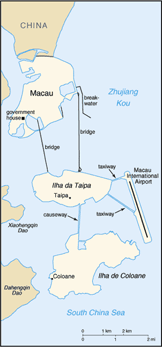
Call 0330 880 3600 Calls may be monitored or recorded. Opening Times.
- TRAVEL INSURANCE
- COVID-19 ENHANCED COVER
- More Options
- Help & Advice
- Existing Customers

Call 0330 880 3600 Calls may be monitored or recorded. Opening Times.

Need help?
UK Customer Services0330 880 3600
Open Mon - Fri 9am - 5pm, Sat 8.30am - 4pm, Closed Sunday..
(Calls may be monitored or recorded)
Contact details can be found in your policy documentation
Available 24 hours a day, every day

Region: Asia & Oceania
Full Name: Macau Special Administrative Region
Capital City: N/A
Language Spoken: Cantonese 87.9%, Hokkien 4.4%, Mandarin 1.6%, other Chinese dialects 3.1%, other 3% (2001 census)
Get travel insurance to Macau from Direct Travel Insurance. We offer low cost and high quality travel insurance to Macau and most of the world.


22 10 N, 113 33 E
lowest point: South China Sea 0 m highest point: Coloane Alto 172.4 m
total: 0.34 km regional border: China 0.34 km
typhoons
NEGL
arable land: 0% permanent crops: 0% other: 100% (2005)
NA
453,125 (July 2006 est.)
0-14 years: 16.2% (male 37,934/female 35,412) 15-64 years: 75.9% (male 163,975/female 179,830) 65 years and over: 7.9% (male 15,099/female 20,875) (2006 est.)
total: 36.1 years male: 35.7 years female: 36.4 years (2006 est.)
0.86% (2006 est.)
8.48 births/1,000 population (2006 est.)
4.47 deaths/1,000 population (2006 est.)
4.56 migrant(s)/1,000 population (2006 est.)
at birth: 1.05 male(s)/female under 15 years: 1.07 male(s)/female 15-64 years: 0.91 male(s)/female 65 years and over: 0.72 male(s)/female total population: 0.92 male(s)/female (2006 est.)
total population: 82.19 years male: 79.36 years female: 85.17 years (2006 est.)
1.02 children born/woman (2006 est.)
D,G
Visa immigration information
No Test Required
N/A
The quality of dental care in Macao is sufficient for routine care
Some international medication is available from the larger pharmacies.
Blood supplies are considered safe and screened to international standards
Several major hospitals in Macau have adequate medical facilities and are able to provide emergency medical care. Highly developed medical facilities and trained personnel are available in Hong Kong, which is about an hour by jetfoil and ten minutes by helicopter from Macau.
Recent medical and dental exams should ensure that the traveler is in good health. Carry appropriate health and accident insurance documents and copies of any important medical records. Bring an adequate supply of all prescription and other medications as well as any necessary personal hygiene items, including a spare pair of eyeglasses or contact lenses if necessary. Drink only bottled beverages (including water) or beverages made with boiled water. Do not use ice cubes or eat raw seafood, rare meat or dairy products. Eat well-cooked foods while they are still hot and fruits that can be peeled without contamination. Avoid roadside stands and street vendors. Swim only in well-maintained, chlorinated pools or ocean water known to be free from pollution. Wear clothing which reduces exposed skin and apply repellents containing DEET to remaining areas. Sleep in well-screened accommodations. Carry anti-diarrheal medication. Reduce problems related to sun exposure by using sunglasses, wide-brimmed hats, sunscreen lotions and lip protection.
AIDS occurs. Blood supply may not be adequately screened and/or single-use, disposable needles and syringes may be unavailable. When possible, travelers should defer medical treatment until reaching a facility where safety can be assured. The blood type of the general Asian populace is Rh positive; Rh negative blood may be difficult to obtain.
Hepatitis A: Consider active immunization with hepatitis A vaccine or passive immunization with immune globulin (IG) for all susceptible travelers. Especially consider choosing active immunization for persons planning to reside for a long period or for persons who take frequent short-term trips to risk areas. The importance of protection against hepatitis A increases as length of stay increases. It is particularly important for persons who will be living in or visiting rural areas, eating or drinking in settings of poor or uncertain sanitation, or who will have close contact with local persons (especially young children) in settings with poor sanitary conditions. Hepatitis B: Vaccination is advised for health care workers, persons anticipating direct contact with blood from or sexual contact with inhabitants, and persons planning extended stays of 6 months or greater (especially those who anticipate using local health care facilities, staying in rural areas, or having intimate contact with the local population). Japanese Encephalitis: Vaccination is not routinely recommended for travelers, although rare cases have been reported and some risk may exist from April to October. Rabies: Preexposure vaccination should be considered for persons staying longer than 30 days who are expected to be at risk to bites from domestic and/or wild animals (particularly dogs), or for persons engaged in high risk activities such as spelunking or animal handling. Need for vaccination is more important if potential exposure is in rural areas and if adequate postexposure care is not readily available. Typhoid: Vaccination should be considered for persons staying longer than 3 weeks, adventurous eaters, and those who will venture off the usual tourist routes into small cities, villages and rural areas. Importance of vaccination increases as access to reasonable medical care becomes limited. Contraindications depend on vaccine type. Note: All routine vaccines (such as DTP or Td, Hib, MMR, polio, varicella, influenza and pneumococcal) should be kept up-to-date as a matter of good health practice unrelated to travel.
Insect-borne illness: Dengue fever - occurs Encephalitis (Japanese type) - occurs Hemorrhagic fever (with renal syndrome) - occurs Food-borne and water-borne illness: diseases such as the diarrheal diseases and viral hepatitis are common. Other hazards: High levels of immunization coverage have reduced the incidence of diseases such as measles and diphtheria. Influenza risk extends throughout the year.
None.
No recent disease outbreaks
N/A
N/A